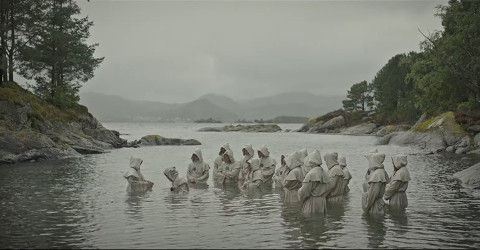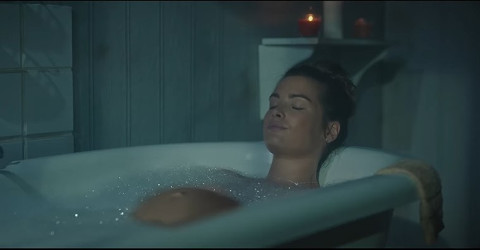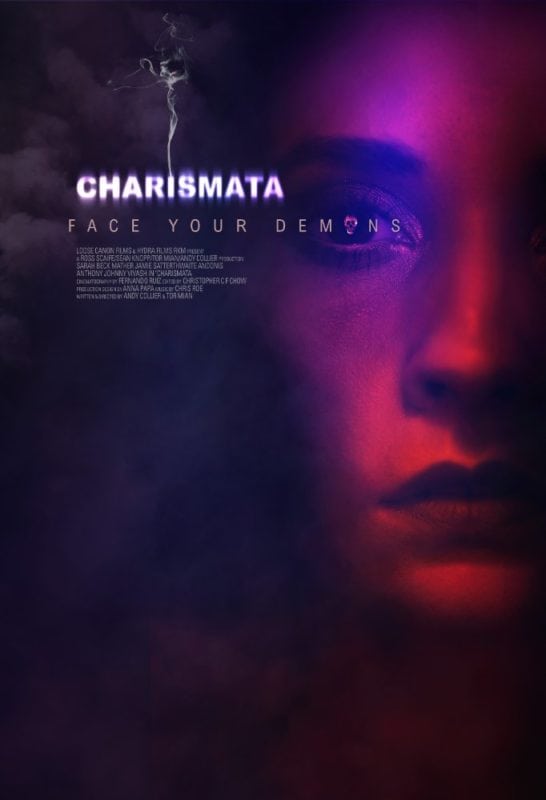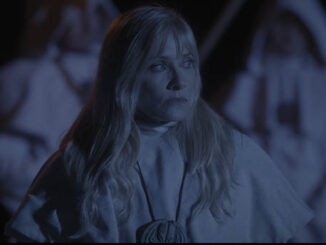Sacrifice (2020)
Directed by: Andy Collier
Written by: Andy Collier, Paul Kane, Tor Mian
Starring: Barbara Crampton, Ludovic Hughes, Lukas Loughran, Sophie Stevens
UK
AVAILABLE ON DIGITAL: NOW, from 101 FILMS
RUNNING TIME: 87 mins
REVIEWED BY: Dr Lenera

Isaac is returning to the place of his birth, traveling with his pregnant wife Emma to a Norwegian island where he’s to clean up and sell his childhood house. Though initially met with hostility, this turns to friendliness when Isaac reveals his heritage. Then the local policewoman Renate comes calling with some shocking news; Isaac’s father was murdered inside the very same house. Nonetheless, Isaac becomes increasingly connected to his homeland while Emma keeps on having nightmares and wants to return to the United States….

When our webmistress Bat got her latest list of screeners through, I believe that Sacrifice, which was originally intended to be called The Colour Of Madness, was called ‘folk horror’ since that what she said the film was. Indeed it does indeed contain some of the tried and tested elements of this subgenre which for some reason I do find to be of particular interest, sometimes coming across as Midsommar [my favourite film of 2019] written by a very drunk person. But it also turned out to be yet another H. P. Lovecraft-inspired piece, such things starting to proliferate of late due to his work lapsing into the public domain. It’s credited as being inspired on a story by Paul Kane entitled ‘Men Of The Cloth’ “and the works of H. P. Lovecraft”, the latter seeming to be mostly The Shadow Over Innsmouth, which also inspired the film Dagon far more than the actual Lovecraft tale that has that title. It has a terrifically sinister atmosphere, director Andy Collier in what is his second feature showing a great talent in being able to make the viewer unsettled as well as present a visually stylish piece with interesting shots and transitions. However, the script, which he wrote with Tor Mian, has very few surprises, tending to just deliver expected beats, even in the climax where, with two expected outcomes, we firstly get one of them, then a twist reveal that then delivers the other one. What’s genuinely infuriating though are the number of occasions when either Emma or Isaac – usually the former but sometimes the latter – wake up and we realise that the last few minutes were a dream. Granted, the theme of dreaming is explicitly stated several times, it being hinted at that the population of this island have a dream link with ‘The Slumbering One’, but it becomes a lazy, tiresome device and in at least one case not even necessary since it seems that some things did actually happen.
Oh well, the appropriate mood is nicely set in the opening titles with truly sinister music from Tom Linden and trippy images which are probably just shots of different colour paints spreading but which look good anyway. We cut to a woman leaning over a sink trying to wash some blood down the plughole. She goes upstairs, wakes up a small child, and flees with it, driving frantically to a boat where somebody is waiting to take them away, after which we cut to a man standing on another boat, gazing out at the water. One thing seems apparent already; Collier and his editor Harry Baker have a knack for clever and effective cuts between scenes which they are often able to link together. The man is Isaac who’s with his wife Emma, returning to his childhood home to sort out some affairs. “It’s definitely smaller than I remembered” he remarks as he explores the rundown house where he once lived while she finds out that the water is most definitely not drinkable. All the usual visual devices are employed to make the place look as creepy as possible such as very selective use of colour and rooms being photographed so they dominate the people going into them. The couple come across a painting that Isaac used to be transfixed by as a child. They look into a stormy sea, a boat, and – possibly – something in the water, and we cut to a shot taken from the perspective of the painting. Sacrifice becomes disappointing in quite a few ways, but a lot of effort has been made into the visual side of things so one can always admire various set ups and cuts if you lose interest in the plot. As nighttime arrives, the camera pans from the house to the garden and looks out at the sea where a portion of the water glimmers green. Cut to Isaac sinking into a mess of tentacled black goodness before the colour lightens and we realise that we’re in saucepan of boiling water with two eggs in it!
Of course there’s the local pub which, before you can say An American Werewolf In London, is where our duo venture into and get a frosty reception. “Do you speak English”? asks Isaac. “Do you speak Norwegian”? replies the barman. Neither will give in, the argument goes into who first reached America, and eventually some mild violence results with Isaac as the victim. Now one of the things that exasperates me about not just a lot of modern film criticism but sadly some of the people who watch films is that any movie that depicts people of another country as villainous is automatically racist, this ridiculous idea perhaps having hit depths with the hair-brained criticisms of Sicario 2 and Rambo V. I will give ground a little and agree that a great many horror films adopt a xenophobic attitude, but I see this more as exploiting fears that many people, rightly or wrongly, have – which is something that the genre has always done. Sacrifice hopefully avoids such criticisms by undercuts this in the pub scene where, even if we don’t condone violence, we do sympathise with the Norwegians who’ve been shown disrespect by these visitors who seem to be like so many others who go to places but make no attempt to learn the native tongue of the place and expect everyone to speak English. What’s interesting is that Isaac does seem to know some Norwegian judging by what we heard on the boat, but it to proud [or should that be arrogant] to use it. In any case, Isaac eventually states who he actually is, something he ought to have done a bit earlier, and suddenly everyone’s really nice, especially Gunnar, who plies Isaac with beer. Upon returning to the house, Isaac is in such a state that he has to be put to bed by Emma.

But what can be worse for a hangover than having a policeman knock at the door in the morning, possibly informing you of what you did while you were out on the lash? ’She’s played by Barbara Crampton who of course was in what is still probably the finest Lovecraft-inspired film Re-animator as well as From Beyond. So I understand why she’s in this, and apparently the role was originally for a male actor until she became interested in the part, but having her play a Norwegian woman did not result in believability, because her accent often sounds more Irish and even American even though she trained with a dialect coach. It’s rather distracting, sad to say. Renate tells Isaac that not only was his father murdered with six blows to the head from a blunt instrument, but that he’s standing on the very same spot where it happened and the stain underneath his feet is the blood! She then drops another bombshell, but of course Isaac doesn’t believe her. Renate invites the two round for dinner where her daughter Astrid keeps looking at Isaac while barely saying a word, not even saying what the ingredients of the meal that she cooked were. But Renate seems nice anyway, and Isaac soon becomes very happy to make his house into a place worth selling, while getting drunk with Gunnar looking at the aurora borealis and even participating in a baptism-type rite where everyone wears cloaks and hoods. He’s starting to feel at home. However, he’s also starting to neglect his wife. Pregnant Emma is becoming bored when she hasn’t been frightened by these dreams she keeps on having which usually involve chanting and quick, partial glimpses of some kind of octopus creature. The latter is The Slumbering One or, as the more accurate translation of the text on a wall-mounted engraving says, the Tree Of The Shadow Of the House Of The Dead – though we may as well call it Cthulhu. This being is clearly not just some sort of deity to the islanders but a thing that’s alive in thoughts and minds.
One really gets an ominous sense of the presence of this thing, maybe lurking in the water, but it’s not followed through in what is really something of a [to use a very un-PC term but you know me by now] prick tease. Monster lovers you’re going to be very disappointed; no big creature shows up in the climax, and I do wonder if one was originally intended until it was realised that the low budget wouldn’t have allowed for one. Of course that wouldn’t be so much of a problem if the climax, which lazily copies the two finest films in the folk horror subgenre without replicating the pure terror that they evoke [and this is after multiple viewings], wasn’t so pedestrian, unexcitingly staged, and just plain unconvincing. Much of what has come before has been extremely formulaic, so much so that after a while the clever visual devices seem to be there to attempt to make up for this, and some of the It’s All A Dream repeating just seems more as if Collier and Mian had written themselves into corners rather than going for the illusion versus reality approach. A knowing look between two characters early on is extremely noticeable and if you’re like me you’ll be working out some of the rest of the plot from thereon; it would have worked better if it hadn’t have been so noticeable. The atmosphere is strong, the cinematography which is also done by Collier is very impressive with some strong use of colour, Linden’s music gets under the skin even if one repeated cue is eerily similar to my favourite one in Bobby Krlic’s score for Midsommar, but all of this can only do so much when set to accompanying such average material.
Scenes that seem as if they’re going to be really strong tend to either hold back or end before their full potential seems to have been realised. A Shivers-like moment with Emma in the bath feels like it’s going to get extremely uncomfortable and I was really starting to brace myself, but then she wakes up. Well, I think she wakes up; I got tired of writing down in my notes “she wakes up” so it’s possible that the scene just cut to another – though I rather doubt it. The camera seems obsessed by liquids, though some of the bleak beauty of Volda the main location is evoked. Of course the heart of the story is a person re-discovering their roots which almost always makes for a fulfilling watch, though the shortness of most of the scenes here means that the dialogue that concerns this is very much on the nose and things seem a bit rushed. American actors Ludovic Hughes and Sophie Stevens do okay with their English accents and are fine in their roles individually, but they don’t convince as a couple, not sharing any warmth or chemistry. However, they are very good together when things unravel, with Hughes being quite frightening. Sacrifice manages to intrigue even when it’s not really delivering, and always seems to be on the verge of becoming better than it actually is. As a filmmaker Collier has some considerable talent, and he almost manages to elevate his slender material into something notable by pure style alone, but in the end fails to get there.
Rating: 














Be the first to comment